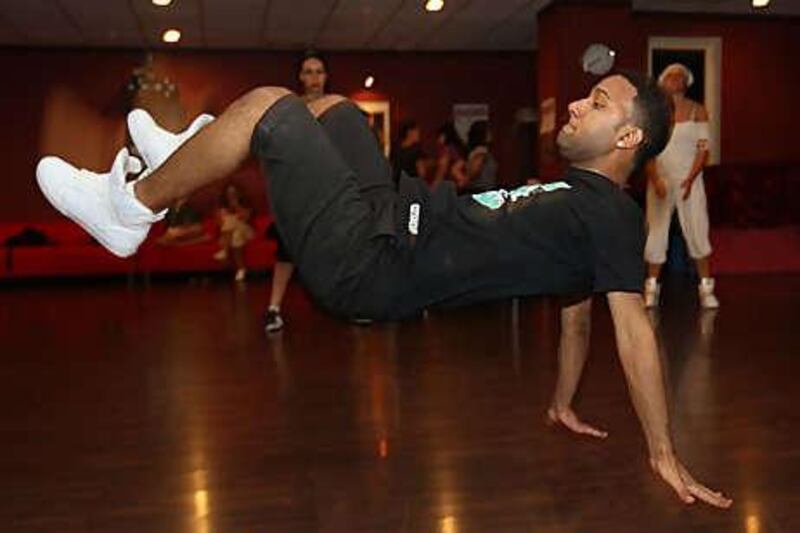DUBAI // Breakdancing has taken some time to work its way to the UAE - it first started on the Bronx streets of New York in the 1970s.
But the dance is now a growing movement in Dubai and Waheed al Mawaly, 23, is one of its pioneers. The Emirati engineering student first began trying out some moves at six or seven years old, inspired by his idol Michael Jackson. He is still trying to perfect the famous moonwalk. Now, he teaches breakdancing as well as performing with visiting international artists to the emirate such as the R'n'B act Blackstreet and the Russian singers TaTu.
"I tried to imitate Michael Jackson, to imitate his moves," he says. "It wasn't breakdancing in the beginning but as I got better, I got into other kinds of dances like popping and locking." The wave-like motions of popping and locking were just the start of his transition into breakdancing. He and his two brothers would spend hours each day practising. "It was just a desert and nobody was out there doing this. It was just me and my brothers."
It was in 2000 that he became interested in breakdancing, after seeing a dance competition in Deira. "It was something completely different," he recalls. "People were doing all these crazy moves like head stands. I was so impressed. "I'd seen people head spinning on TV but I never thought people could really do it. I thought it was some mirror trick or computers." He and his brothers went home that same day and decided to try out some of what they had seen. From then on, he was hooked.
"We were practising for about four or five hours a day and I'd always be thinking about the moves, or busting moves anywhere, I was in the shopping malls, practising on the beach. "There was no support for breakdancing back then, no dance halls with mirrors, it was just the traditional stuff," he says. Within the next 18 months, the boys had become a firm "crew", but he admits not everyone was so impressed with their hard work. "Mum was cool with it but dad thought it was crazy. He thought I looked like a monkey," he smiles.
"He never thought anything would come of it but here I am, having performed with international artists, teaching," he says. Mr al Mawaly said 2002 was the turning point, when the three boys entered the dance-off that had inspired them two years before. "We didn't win but we got a lot of respect and that's when things started to change. We formed a proper crew." By 2005 they were being asked to perform in schools and nightclubs.
"We were getting paid peanuts in the beginning but it was amazing to just see people smiling and clapping for us. We did it for that love," he says. "It's always been my dream to be an engineer," said the student, who is at the Emirates Aviation College. "Even when I'm an engineer though, I'll be dancing my way through fixing planes." Some say breakdancing has its roots in dance forms such as the Lindy Hop combined with some martial arts-inspired moves.
He counts some of his favourite moves as the head spin and the flare, where the dancers spin round on their arms without their feet touching the floor. There are still moves he says he wants to perfect, including the air track, a windmill-like movement that is possibly the hardest and most dangerous. Now, he has built a solid reputation and is the first port of call for visiting acts. "It's a growing scene here, people are coming from all over the world to see what's going on now," he said. "We've had dancers from France trying to encourage the development of the scene as well as crews from America, which is amazing."
Nora Bouchaibi, the manager of Nora Dance School in Knowledge Village, where Mr al Mawaly teaches twice a week, said: "Waheed's got everything, he's a great dancer and an inspirational teacher. In time, he'll be leading the teaching staff. He's very well respected." She has witnessed things changing. When she came to Dubai nine years ago from France, there was no dance culture, no dance schools and no outlet to develop new talent.
"This is something that's growing, little by little, people are becoming more open to it." "We need Emiratis to be a part of this," she added. "This is the UAE. It's important for us." Mr al Mawaly admits he is surprised at the popularity of breakdance and other dance forms such as hip hop among Emiratis. "There's a lot of Emiratis in the dance battles now," he says. "It's a way to communicate with people. It's built a community, like a family. Dance is a way to meet totally different kinds of people and you learn to respect each other no matter what someone's nationality is."
His brother Thabit, 21, says their parents now accept that it is not just a phase they were going through. As the younger sibling, he was always competing to keep up with his brother and says the element of competition is still there between them. As they grew up, their loud music and crashing around practising new dance moves would, invariably, get them into trouble. "We've learnt to keep the music down now," Thabit laughs. But he knows his brother is responsible for not only bringing him into dance, but many others around them.
"Wherever we went and whenever people saw him dance, they'd always want to learn as well," he said. mswan@thenational.ae






